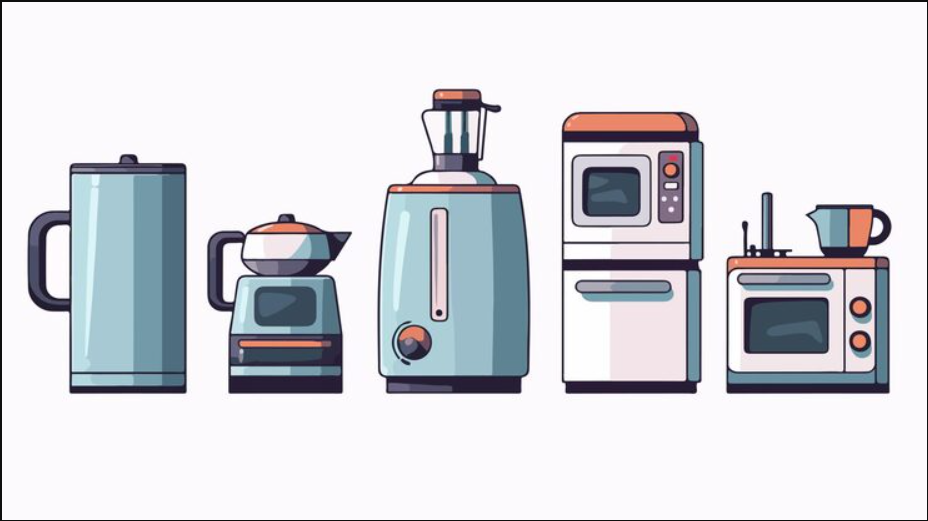How to Maintain Kitchen Appliances for Longer Life

Kitchen appliances play a crucial role in daily household routines, helping with cooking, cleaning, food storage, and preparation. Whether it's a refrigerator that keeps groceries fresh, a microwave that reheats meals within seconds, or a dishwasher that handles piles of utensils at the end of the day, these appliances make modern living more convenient and efficient. However, frequent use, lack of maintenance, and improper handling can cause appliances to wear down quickly, leading to frequent repairs, reduced performance, and costly replacements. Learning how to care for these appliances properly not only extends their lifespan but also ensures smooth, safe operation for years to come. Below is an in-depth guide to maintaining kitchen appliances for longevity.
Regular Cleaning Prevents Wear and Tear
One of the most effective ways to extend the life of kitchen appliances is routine cleaning. Over time, grease, food residue, stains, and dust accumulate on surfaces and internal parts. This buildup can affect performance and even cause mechanical failures. For instance, clogged microwave vents can cause overheating, while dirty refrigerator coils make cooling inefficient.
Each appliance requires specific cleaning methods. Microwaves should be wiped inside and out with mild soap after use, especially if food spills or splatters occur. Refrigerators should be cleaned monthly, with expired items removed and shelves sanitized to prevent odors and bacterial growth. For ovens, leftover grease can lead to smoke or even fire hazards, making regular scrubbing essential. A clean appliance consumes less energy, works efficiently, and lasts longer.
Proper Usage Increases Durability
Using appliances correctly is just as important as keeping them clean. Every device is designed to operate within certain limits, and exceeding them causes strain. For example, overloading a mixer grinder can burn its motor, while stacking heavy containers in a refrigerator door may damage the hinges.
Following manufacturer guidelines ensures safe and optimal performance. Dishwashers should not handle non-dishwasher-safe items, such as wooden or cast-iron utensils. Microwave ovens should never contain metal objects, as they reflect heat and cause sparks. Overuse of high-power settings on induction cooktops can wear out sensors and heating coils more quickly. Learning how to operate appliances correctly prevents unnecessary stress and prolongs their functional life.
Routine Servicing Helps Detect Hidden Issues
Many appliances function smoothly even when they have internal wear that is not visible to the user. Regular servicing helps identify issues early, preventing expensive breakdowns. Refrigerators should be serviced annually to check coolant levels, thermostat settings, and compressor health. Chimneys and exhaust hoods require servicing every 3–6 months due to grease accumulation that affects suction power.
Water purifiers need filter replacements to ensure safe drinking water, while ovens and microwave circuits should be inspected for electrical damage. Servicing not only enhances performance but also keeps appliances safe, especially those involving high heat or electrical components.
Maintain Electrical Safety and Power Protection
Kitchen appliances are often exposed to voltage fluctuations, heat, and moisture, making electrical safety essential. Power surges can damage circuit boards in refrigerators, microwaves, and induction cooktops. Using surge protectors and stabilizers helps protect sensitive electronics. Heavy appliances like refrigerators should be plugged into dedicated sockets to prevent overload.
Worn-out wires, loose connections, and damaged plugs should be replaced immediately. Appliances should never be operated with wet hands or placed near water sources to prevent electric shocks. Proper grounding ensures safety and enhances appliance durability.
Ventilation and Placement Matter
Heat-generating appliances require sufficient space and airflow to function efficiently. Refrigerators must be placed away from walls with adequate gap for heat dissipation; keeping them too close strains the compressor. Similarly, microwave ovens should not be enclosed tightly in cabinets where vents get blocked, as restricted airflow leads to excess heat buildup.
Kitchen chimneys and exhaust fans should be correctly positioned above the stove to capture as much smoke and oil fumes as possible. Induction cooktops and air fryers should be placed on flat surfaces to ensure stable heating. Proper placement enhances efficiency, reduces overheating, and lowers energy consumption.
Replace Small Parts, Not Entire Appliances
Many appliances stop working due to minor faults rather than total failure. Replacing small components—such as gaskets, filters, heating coils, and knobs—can restore full functionality and extend appliance life. Dishwasher spray arms, refrigerator door seals, and mixer grinder blades wear out over time and should be replaced when performance drops.
This approach is cost-effective and environmentally friendly, as it reduces electronic waste and avoids unnecessary appliance disposal. Always use original manufacturer-recommended parts to ensure compatibility and safety.
Keep Appliances Dry and Rust-Free
Kitchen environments often involve moisture from cooking, washing, and steaming. This exposure leads to corrosion, rust, and mold growth, especially on metallic surfaces. Keeping appliances dry after use can prevent damage. Wipe water droplets from mixer grinder jars, pressure cooker plates, and stove burners to keep them rust-free.
For refrigerators and dishwashers, door gaskets must be dried after cleaning to prevent mold and bacteria. Moisture also affects internal wiring, so electrical appliances should be kept away from sinks and wet countertops.
Conclusion: Care Today Means Savings Tomorrow
Maintaining kitchen appliances is not just about extending their lifespan but also about improving daily efficiency, saving money on repairs, and ensuring safety. By adopting habits such as regular cleaning, proper handling, routine servicing, and safe electrical practices, households can keep their appliances running smoothly for years. Competent care helps preserve performance while reducing environmental impact and household costs. With consistent attention, kitchen appliances become long-lasting assets that continue to support daily routines without interruption.
- Art
- Causes
- Crafts
- Dance
- Drinks
- Film
- Fitness
- Food
- Spellen
- Gardening
- Health
- Home
- Literature
- Music
- Networking
- Other
- Party
- Religion
- Shopping
- Sports
- Theater
- Wellness


